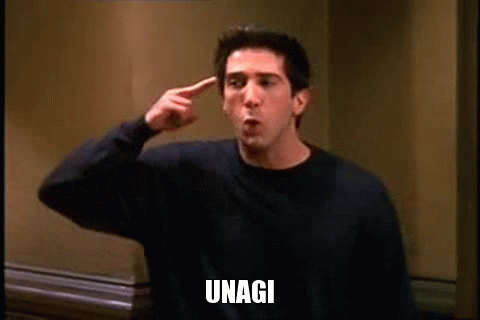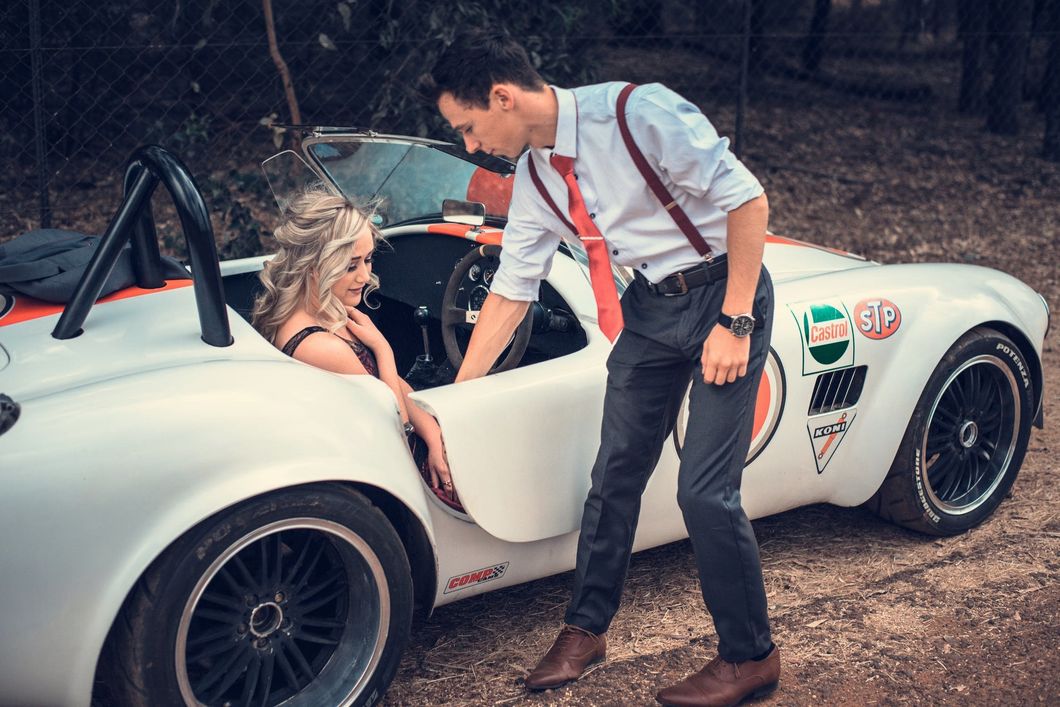Here Are 33 Times 'Friends' Showed Us Why We Should Be Thankful
There is always a good excuse to watch our favorite TV show.
I love Thanksgiving. It is the perfect time to share with the family and enjoy great food. For me, it is time to watch my favorite Tv shows' Thanksgiving-themed episodes. It is so funny to see all these characters to confront their families and talk about hidden secrets.
The king of Thanksgiving-themed episodes is "Friends." It gave us nine amazing stories of Thanksgiving. My favorite one is when Brad Pitt plays Will, a former classmate of Monica, Rachel and Ross. I cannot forget the episode of old Thanksgivings when we can see all of the characters younger, or the Geller Cup, or Monica with a pirate patch.
1. Nobody has worse Thanksgivings than Chandler.
2. Our families are awesome. Let’s face it; after Phoebe’s family, ours is just perfect.
4. You can love and lose a Richard, but you always can have a better second chance, a Chandler.
5. I can make better deserts than Rachel.
6. I am smart enough to not insert my head in a raw turkey.
7. I don’t have a crazy stalker. Joey got Erika who actually believed he was Dr. Ray Ramone.
8. I don’t have a crazy crush with a monkey (I don’t have to say more).
9. I don’t have a failure love like Gunter with Rachel.
10. My best friend is not in Aruba with my ex-fiancé, like Rachel, Barry and Mindy.
 Friends Tv GIF - Find & Share on GIPHYGiphy
Friends Tv GIF - Find & Share on GIPHYGiphy11. I have seen better stripers than Danny DeVito.
12. I am not a freaky cleaner like Monica.
13. The copy guy does not lie to me saying he is Ralph Lauren (and I know what Ralph Lauren looks like).
14. I don’t have a jealous and complicate boyfriend like Ross.
 Stressed Jennifer Aniston GIF by Nick At Nite - Find & Share on GIPHYGiphy
Stressed Jennifer Aniston GIF by Nick At Nite - Find & Share on GIPHYGiphy15. My friends believe more in my talent than Rachel, Rose, Phoebe, Monica and Chandler in Joey.
16. My apartment is cleaner than Cheryl’s. (Do you remember Rebecca Romijn playing an anthropologist dating Ross?)
17. None of my ex-boyfriends left in hope of winning a Nobel prize.
18. I don’t have a Janice in my life.
 Oh My God Omg GIF by Nick At Nite - Find & Share on GIPHYGiphy
Oh My God Omg GIF by Nick At Nite - Find & Share on GIPHYGiphy20. I don’t have a sister making porn movies using my name.
21. I know my lobster is somewhere waiting to meet me (maybe I met him already, and I did not realize it).
 French Kiss Friends GIF - Find & Share on GIPHYGiphy
French Kiss Friends GIF - Find & Share on GIPHYGiphy22. I am not in love with my best friend partner.
23. I am not dating an ex of my best friends.
24. My hair does not go crazy with humidity.
25. I am working in a research in Russia getting no results after ten years.
26. I am not the public face of Gonorrhea.
27. Dr. Green is not my father in law.
28. He said the right name on the altar.
29. I have never run away at any wedding.
30. Joanna is not my boss or my friend’s date.
31. My job does not request to wear false boobs or roller skates.
32. Either Ross or Monica would give me a message.
33. Bonnie is not dating the guy I like.
I think I am forgetting the most important reason; I must have thankful because I can watch "Friends'" Thanksgiving-themed episodes any time.



 Lisa Kudrow Thank You GIF - Find & Share on GIPHY
Lisa Kudrow Thank You GIF - Find & Share on GIPHY






















If Someone Checks Your Racism You're Not The Victim Here, So Here Are Some Tips For Not Acting Like It Either
The way you react to being accused of racism can have a bigger affect than the ignorance in the first place, so here's how to respond in those situations.
Psychology Today defines a "Microaggression" as "everyday verbal, nonverbal, and environmental slights, snubs, or insults, whether intentional or unintentional, which communicate hostile, derogatory, or negative messages to target persons based solely upon their marginalized group membership." To put it more plainly, its anything discriminatory that isn't 100% over.
With that in mind, it may seem to some that literally, everything is off limits to joke about nowadays. While the '90s and early 2000s was full of fake acceptance cloaking heavily problematic stereotypes, assumptions, and misconceptions about marginalized groups, it's left us with a heavy "us vs. them" mentality, with "regular people" on one end and "snowflakes" on the other.
"Snowflake" is a relatively new term commonly employed by conservatives to mock the emerging atmosphere of political correctness, "safe spaces" and the uphill battle minorities face in pursuit of equal rights.
The reason for this, among other things, is the fact that the emerging adult community was raised in the above mentioned standards that were upheld in the '90s and early 2000s. Therefore, we're left with people who think they can, and should get away with anything so long as they aren't waving a Nazi flag or sporting white sheets over their heads.
Studies confirm that many people harbor unconscious racial biases, whether or not they would classify as a full-blown racist.The thoroughly depressing reality of that aside, that along with white guilt, or a sense of shame white people may experience considering the demographic's historical treatment of people of color and other minority peoples, can make racial issues exceptionally difficult to talk about.
With lack of communication comes inevitable ignorance of how a comment, action or opinion may be considered offensive to a marginalized person, leaving many social interactions with both parties angry, sad or even fearful from its outcome.
Ignorance is often not the explicit fault of the ignorant person. However, the problem with today's society is not solely ignorance, nor that people are too sensitive all of a sudden.
For the first time in the nation's history, the social climate allows minority people to be emboldened enough to call people out on their racism. This is a massive societal win for many marginalized groups who no longer have to stand in as a token for their demographic so corporations can meet their diversity quota.
Although, it was clearly not something the bulk of the nation was prepared for.
With the mixture of this newfound liberation for minority groups, an ignorance that has spanned centuries and how difficult people find it to communicate about racial issues, we have the perfect storm for someone to go on the defense instead of treating the accusation of racism as a learning experience.
Thankfully, the concepts behind responding in an appropriate way are pretty straight forward.
1. You Are Not The Victim Here.
There are too many people who get accused of saying something offensive, then immediately go on the defensive. This gets everyone absolutely nowhere.
It probably really sucks to feel like someone thinks you're a terrible person, especially when you didn't realize you were in the wrong. Considering America's history with racism, being singled out for contributing to that is going to bring up a lot of feelings. So naturally, people may turn to arguing and making excuses for the terrible thing they did or said.
The pro-level of this reaction is when a person points out something ignorant or discriminatory, then the accused starts crying.
This immediately takes the attention off of the victim and onto the offender, because the offender then needs to be consoled before any progress in the interaction is made.
Any of these reactions, or feeling that someone is being "mean" to you by checking your ignorance, is a product of white privilege. So, if you care about being a good ally to the marginalized section of our community, its best to save the crying or yelling as a last resort.
2. Apologize First.
Do not pass go, do not collect $200.
Apologizing first, even if you don't understand what you've done, keeps all doors of communication open so you can dig deeper into the situation a little more.
Even if you don't feel remorse—out of ignorance, stubbornness or skepticism—apologizing first acknowledges that they are a human that deserves respect which you've just violated somehow.
Here our pre-school days come in handy, as we can all do well to "treat other's like we want to be treated". Think on how you'd feel if someone disrespected you in the middle of your day, then that empathy should be applied to whomever you've hurt.
If the accused responds in any way besides this, the opportunity for fixing things is annihilated, and the hurt that you both are feeling has no chance of being relieved. Granted, after an apology has been issued and a conversation follows, you might still feel that you're in the right or feel bad in general. However, you still did your best to alleviate some of their discomforts, maintained the cordiality of the relationship and know how to avoid similar situations in the future.
3. Prove To Yourself And Them You're Not A Bad Person
I'm multiracial but look white as hell. I was ignorant as hell as a kid. I've been there where something you said offended when it was clearly not your intention. In fact, in the case of microaggressions, the intent is often not to offend.
So, now it's your job to do your best to prove to them and yourself that you're not a bad person.
The only way to accomplish this is by listening.
Listening to why they were offended, why its a problem and asking questions about the reasons behind it or how to avoid repeating the mistake in the future is the key to growing. And consequentially you might get to learn something that day, which everyone should be thankful for.
Facing these interactions humbly and with an open mind encouraged growth as well as learning, so even though you may feel like crap, this opportunity is definitely a good one.
4. Follow Through
After the badness has happened and been pointed out, an apology has been made and a conversation has been had, the effect of the situation should not end there.
If you're still a little unclear on the offense or want more information, take it upon yourself to watch a Ted Talk or two to keep the conversation going internally.
Then, it's important to actually apply what you've learned to your thoughts, words, and actions. Once it's been pointed out its much easier to identify discriminatory lines of thinking, reconsider previous opinions and even reevaluate how ignorance might be applied to other areas that you hadn't thought of.
If you feel they might still be upset, especially if they're someone you run into often or work with, a check in can go a long way, too. A simple "Hey, I just wanted to make sure you're still OK after the other day" can easy any resentment that might be lingering. Even if that still doesn't fix things, you know you've done everything in your power to make it right.
Even attempting to follow these steps can make all the difference in developing the quality of our interactions a safer society for everyone. Although this may seem like inconsequential in the grander scheme of things, change is truly inspired one baby step at a time, so don't knock it till you try it.